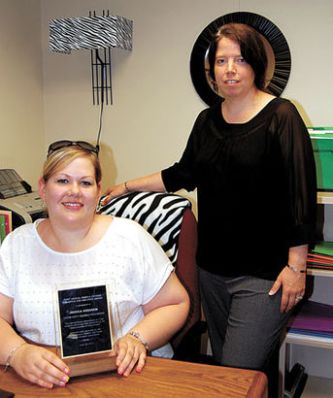When Aaron Fisher, better known as Victim 1, first walked into the Clinton County Child and Youth Services, caseworker Jessica Dershem had no idea about the firestorm brewing behind him.
Dershem, an LHU graduate, had been working with children for about two years when Fisher, not quite 15, showed up on the CYS doorsteps with complaints against legendary PennState football coach Jerry Sandusky.
“I didn’t know who Sandusky was,” Dershem said. “I didn’t realize how big the case would get.”
At first, Fisher would not open up to Dershem. He was a vulnerable, adolescent boy who was scared to share his story with women. Instead, he gradually gained confidence in CYS psychologist Mike Gillum.
“Mike is experienced, male and just really has this way of making kids open up to him,” Dershem said.
Though Gillum played a key role in helping Fisher to open up, Dershem’s part was just as important in breaking this case. She led an interview with Sandusky and his lawyer and eventually testified in court on Fisher’s behalf.
During the interview with Sandusky, Dershem said the coach acted as if his questionable actions with Fisher were perfectly normal. He nonchalantly admitted to kissing Fisher on the forehead, cracking his back and blowing raspberries on his stomach.
However, Sandusky denied any sexual contact.
“He never showed remorse,” she said. “He still hasn’t admitted to doing anything wrong.”
Dershem said Sandusky’s actions throughout the interview only made Fisher’s story more believable, although his lawyer seemed unconcerned.
“The attorney let Sandusky speak freely,” Dershem said. “He never objected to any of my questions or told Sandusky not to say anything.”
Though Dershem did not know anything of Sandusky’s past prior to Fisher’s case, she now firmly believes that he should have been arrested after a report was filed in 1998 stating he showered naked with a pre-teen boy and touched him inappropriately. If this had happened, she said, Fisher and many other boys may have been spared.
Instead, Sandusky got off scot-free while PennState and Sandusky’s charity, The Second Mile, also chose to take no action against him.
While PennState is taking hit after hit in legal fees, lawsuits and other penalties, Dershem believes The Second Mile should also have been looked at more closely before the charity went asunder.
“The program could have survived, but some of the higher-ups should have been let go,” Dershem said. “Rumor has it The Second Mile lost some personnel files on names starting with ‘S’. I don’t know if those files have been found yet.”
Jessica Dershem receives the first annual statewide Pam Cousins Champion for Children Award from Clinton County’s Assistant Director of Children and Youth Services, Jennifer Sobjak.
JIM RUNKLE/ THE EXPRESS